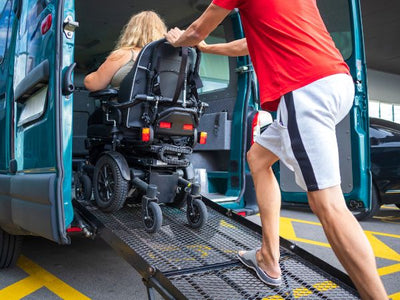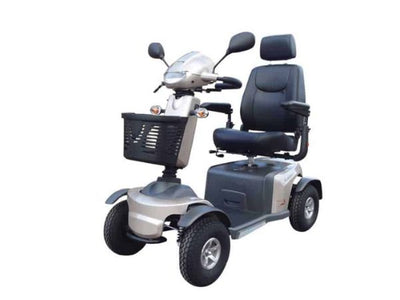Rollators and walkers are essential aids for the elderly and those with stability issues. They offer support, independence, and safety while walking. The main difference is that walkers have four legs and require lifting, while rollators have wheels, a seat, and storage, making them easier to push and more versatile. Which one you should use is based entirely on your needs. Let’s take a closer look at both.

Rollator:
Rollators are designed with convenience and versatility in mind. Here are some key details to consider:
- Wheels on all legs: Unlike walkers, rollators have wheels on all legs, making them easy to manoeuvre without the need for lifting. This feature allows for smoother movement and reduces the strain on your body.
- Built-in seat: Many rollators come equipped with a built-in seat, providing a convenient resting spot during walks or when you need to catch your breath. This feature can be especially beneficial during longer outings or when waiting in lines.
- Balance requirement: While rollators offer excellent support, they do require some level of balance to operate effectively. If you have mild to moderate balance capabilities, a rollator can be a great choice to enhance your mobility. They also don’t require upper arm strength.
- Indoor and outdoor use: Rollators are designed to be versatile and adaptable. You can confidently use them both indoors and outdoors, on various terrains such as pavements, sidewalks, or even rougher surfaces.
- Storage: Rollators contain a storage department which is great for those who require oxygen tanks or who need the extra storage when travelling long distances.
- Hand breaks: With a gentle squeeze to the handle you will easily apply the brakes as needed.
Walker:
Walkers are another popular mobility aid option that prioritises stability and support. Consider these aspects of walkers:
- Wheel options: Walkers typically come in two variants. Most models have no wheels, providing maximum stability and control. Others feature two wheels in the front, which aid in manoeuvring while still offering stability.
- Lifting requirement: Walkers without wheels need to be lifted with each step, making them suitable for individuals who require more support and control while walking. This lifting action can help maintain balance and strengthen muscles.
- Lightweight design: Walkers are generally lighter in weight and good for transport so you can easily take them anywhere you need.
- Support for poorer balance: Walkers are well-suited for individuals with poorer balance or those who need to apply greater weight to the mobility aid. The sturdy frame of a walker ensures enhanced stability, providing a reliable source of support.
In the end, whether you choose a rollator or a walker, the goal is the same - to assist you in maintaining an active and fulfilling lifestyle. By taking into account the features and benefits of each, you can make an informed decision that best aligns with your unique needs and preferences.
A disability should not limit your possibilities
At Equip U, we are committed to promoting independence and mobility for people with disabilities and we have some great options for mobility aids in Townsville. Unlike other retailers, we don't just offer standard products like mobility scooters and accessories. We also provide in-home trials to residents of Queensland, as well as maintenance and servicing for any mobility products. Our NDIS registration allows us to provide funding options so that access to these services isn't limited based on where you live. Our ultimate goal is to work closely with you to bring your vision for improved mobility to life.
If you have any questions about the types of products we offer or how they work, or if you would like to schedule a free at-home product demonstration, please don't hesitate to get in touch with us today.





